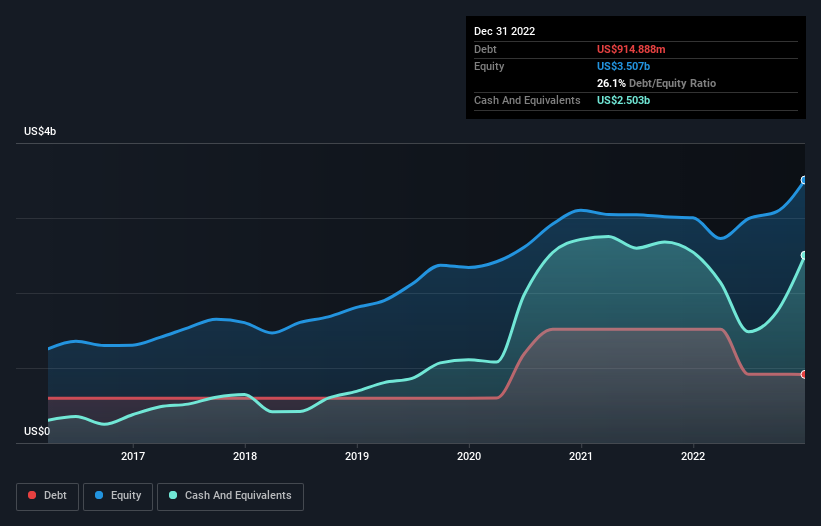- United States
- /
- Consumer Durables
- /
- NYSE:NVR
These 4 Measures Indicate That NVR (NYSE:NVR) Is Using Debt Safely
Some say volatility, rather than debt, is the best way to think about risk as an investor, but Warren Buffett famously said that 'Volatility is far from synonymous with risk.' So it seems the smart money knows that debt - which is usually involved in bankruptcies - is a very important factor, when you assess how risky a company is. As with many other companies NVR, Inc. (NYSE:NVR) makes use of debt. But is this debt a concern to shareholders?
What Risk Does Debt Bring?
Debt is a tool to help businesses grow, but if a business is incapable of paying off its lenders, then it exists at their mercy. In the worst case scenario, a company can go bankrupt if it cannot pay its creditors. However, a more frequent (but still costly) occurrence is where a company must issue shares at bargain-basement prices, permanently diluting shareholders, just to shore up its balance sheet. Having said that, the most common situation is where a company manages its debt reasonably well - and to its own advantage. When we examine debt levels, we first consider both cash and debt levels, together.
See our latest analysis for NVR
How Much Debt Does NVR Carry?
You can click the graphic below for the historical numbers, but it shows that NVR had US$914.9m of debt in December 2022, down from US$1.52b, one year before. However, it does have US$2.50b in cash offsetting this, leading to net cash of US$1.59b.

How Healthy Is NVR's Balance Sheet?
The latest balance sheet data shows that NVR had liabilities of US$795.8m due within a year, and liabilities of US$1.36b falling due after that. On the other hand, it had cash of US$2.50b and US$36.1m worth of receivables due within a year. So it actually has US$385.4m more liquid assets than total liabilities.
This surplus suggests that NVR has a conservative balance sheet, and could probably eliminate its debt without much difficulty. Succinctly put, NVR boasts net cash, so it's fair to say it does not have a heavy debt load!
In addition to that, we're happy to report that NVR has boosted its EBIT by 40%, thus reducing the spectre of future debt repayments. When analysing debt levels, the balance sheet is the obvious place to start. But it is future earnings, more than anything, that will determine NVR's ability to maintain a healthy balance sheet going forward. So if you're focused on the future you can check out this free report showing analyst profit forecasts.
But our final consideration is also important, because a company cannot pay debt with paper profits; it needs cold hard cash. NVR may have net cash on the balance sheet, but it is still interesting to look at how well the business converts its earnings before interest and tax (EBIT) to free cash flow, because that will influence both its need for, and its capacity to manage debt. Over the most recent three years, NVR recorded free cash flow worth 79% of its EBIT, which is around normal, given free cash flow excludes interest and tax. This cold hard cash means it can reduce its debt when it wants to.
Summing Up
While it is always sensible to investigate a company's debt, in this case NVR has US$1.59b in net cash and a decent-looking balance sheet. And we liked the look of last year's 40% year-on-year EBIT growth. So is NVR's debt a risk? It doesn't seem so to us. When analysing debt levels, the balance sheet is the obvious place to start. But ultimately, every company can contain risks that exist outside of the balance sheet. We've identified 2 warning signs with NVR (at least 1 which is significant) , and understanding them should be part of your investment process.
If, after all that, you're more interested in a fast growing company with a rock-solid balance sheet, then check out our list of net cash growth stocks without delay.
Valuation is complex, but we're here to simplify it.
Discover if NVR might be undervalued or overvalued with our detailed analysis, featuring fair value estimates, potential risks, dividends, insider trades, and its financial condition.
Access Free AnalysisHave feedback on this article? Concerned about the content? Get in touch with us directly. Alternatively, email editorial-team (at) simplywallst.com.
This article by Simply Wall St is general in nature. We provide commentary based on historical data and analyst forecasts only using an unbiased methodology and our articles are not intended to be financial advice. It does not constitute a recommendation to buy or sell any stock, and does not take account of your objectives, or your financial situation. We aim to bring you long-term focused analysis driven by fundamental data. Note that our analysis may not factor in the latest price-sensitive company announcements or qualitative material. Simply Wall St has no position in any stocks mentioned.
About NYSE:NVR
Flawless balance sheet with acceptable track record.
Similar Companies
Market Insights
Community Narratives



